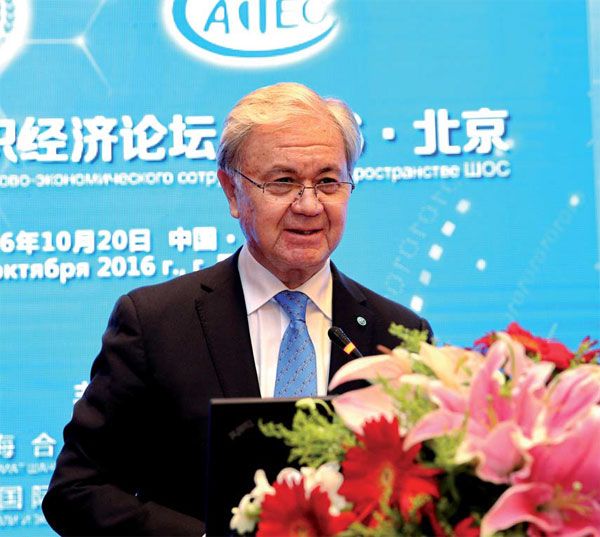SCO chief predicts growth breakthrough
|
Rashid Alimov, secretary-general of the Shanghai Cooperation Organization, speaks at the SCO Economic Forum. Provided to China Daily |
Eurasian region has the resources to be at the forefront of global success, leader tells forum
Members of the Shanghai Cooperation Organization can be expected to lead global economic growth in the next few years, according to the organization's Secretary-General Rashid Alimov.
Attending the 2016 SCO Economic Forum in Beijing on Oct 20, Alimov said that in the next decade, the Eurasian region's economy will lead global economic development, because the region has the most advanced technology, modern infrastructure, and high-quality human resources, which are all essential conditions.
He adds that SCO is in the Eurasian region, which has seen rapid and sustainable economic development and growth surpassing global averages.
"Many great regional initiatives, including China's Belt and Road Initiative, are being implemented. I believe in the next five years we will see new prospects for economic development and also many new forms of economic exchanges," he says.
The forum, which was supported by the Chinese Academy of International Trade and Economic Cooperation under the Ministry of Commerce, gathered economists and other experts to discuss regional economic cooperation and development.
Alimov says a series of initiatives have already been signed and carried out inside the framework of the SCO that define the path ahead for the region. The forum, he says, will also offer members opportunities to have dialogues and to jointly work out measures pushing development into the fast lane.
The organization has already drafted a plan for economic development from 2017 to 2021, outlining how financial organizations in member countries should work together.
"By facilitating trade and investment, we will push forward the free flow of goods, capital, services and technology," he says. "It is an important issue, especially for the SCO members, because their production capacity and economic power varies."
Qian Keming, China's vice-minister of commerce, said SCO members should work on practical measures to push trade and investment, to reduce costs by 10 to 15 percent, reduce barriers and strengthen cooperation in key areas such as transportation, logistics, tourism, education, finance and telecommunication.
He says the Belt and Road Initiative, which focuses on cooperation with countries on infrastructure, interconnectivity and capacity building, will bring opportunities to the regional economy.
Gu Xueming, head of the academy, proposed that SCO members should also create an alliance of economic think tanks to offer long-term intelligence support for regional cooperation. The think tanks could also jointly study the feasibility of SCO free trade zones, Gu said.
Alimov responded positively, saying an alliance would be an important intelligence platform on which experts from different countries could discuss issues of common concern. SCO leaders could also take the opportunity to share ideas that could promote and deepen economic development, he said.
chenyingqun@chinadaily.com.cn



















